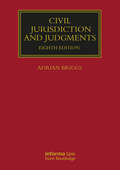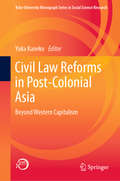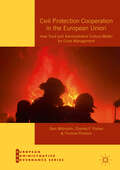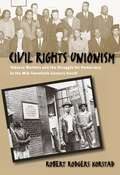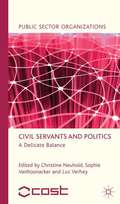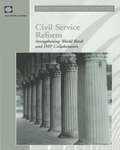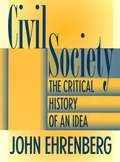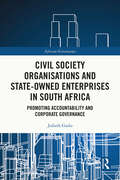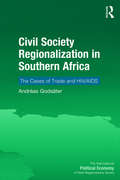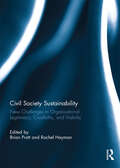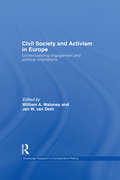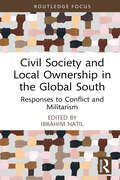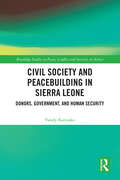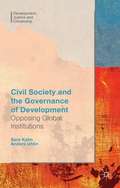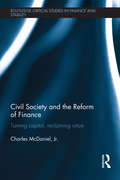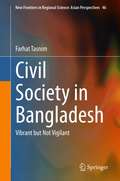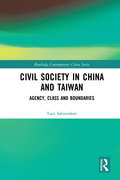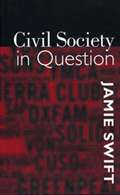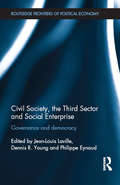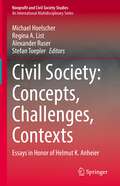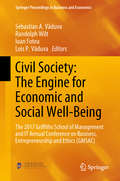- Table View
- List View
Civil Jurisdiction and Judgments (Lloyd's Commercial Law Library)
by Adrian BriggsNow in a fully updated seventh edition, this book remains an established treatise in the field of civil jurisdiction and judgments. It aims to make a full and complete statement of English law on civil jurisdiction and the effect of foreign judgments against the backdrop of significant uncertainty about the consequence of Brexit on the law of civil jurisdiction and judgments. The book looks in detail at: the law after the Brussels Regulation has ceased to operate as part of English law; the substance of the Lugano Convention, which the government hopes to join; the incorporation of the 2005 Hague Convention on Choice of Court Agreements into English law, and developments in the common law rules of jurisdiction, injunctions, and foreign judgments. This text aims to be an authoritative and comprehensive reference for all legal practitioners working in commercial law across jurisdictions as well as the judiciary.
Civil Jurisdiction and Judgments (Lloyd's Commercial Law Library)
by Adrian BriggsNow in its eighth edition, this well-established and respected book by Adrian Briggs continues to deliver a full and complete statement of English law on civil jurisdiction and judgments. As the United Kingdom will now not be re-joining the Lugano Convention, the treatment of judgments from EU Member States and the Lugano States has been reduced, and the jurisdictional rules of Brussels/Lugano regime are now dealt with only in outline. This eighth edition untangles and re-ties the loose ends left over from the process of disengagement from the European Union and restates the law of jurisdiction and judgments as it must be understood today.Significant new material includes an expanded treatment of the increased opportunities for service out of the jurisdiction with and without permission, and of the 2019 Hague Judgments Convention, in effect for the United Kingdom from 1 July 2025. Otherwise recent developments – of which there have been many – across the field of jurisdiction and judgments in civil and commercial matters, are examined in proper detail.This rigorously updated new edition reasserts its position as an authoritative and comprehensive reference for all lawyers and legal practitioners working in the broad area of commercial litigation.
Civil Law Reforms in Post-Colonial Asia: Beyond Western Capitalism (Kobe University Monograph Series in Social Science Research)
by Yuka KanekoThis book focuses on the legal systems of the late-developing countries of ASEAN (Cambodia, Laos, Myanmar, and Vietnam, often referred to as the CLMV countries). These nations are apt to be placed in an economically disadvantageous situation within the opportunity of communalization of legal systems being advanced by the ASEAN Economic Community (AEC) launched in 2015, and the book clarifies the dynamics of the changes within these legal systems. Concurrently, there is an intention to analyze the “legal system development support” that has continued to be provided to these countries since the mid-1990s via international development support from international organizations and developed countries including Japan. In particular, the emphasis has been on the area of civil law, where the main subject of Japan’s support has been centered on the civil code and civil procedure code. The legal system of the recipient country is complicated by the crisscrossing of the remnants of previous eras, from the inherent laws that have existed since before colonization, the laws of the colonial powers that were introduced during the colonial era (French law in Cambodia, Laos, and Vietnam; English law in Myanmar), the influence of socialist law after independence from colonization, and the path of modern industrialization and development, such that one country's legal system is the combination of all of these influences. For the reader to understand the dynamics of these changing laws, each chapter of the book combines two methodological perspectives. The first is to ascertain the spatial range as to how far the civil law extends across social phenomena. The second is a historical perspective in which the trends in legal changes will be understood on a time axis.
Civil Protection Cooperation in the European Union: Administrative Culture, Social Trust And Crisis Management (European Administrative Governance Series)
by Thomas Persson Sten Widmalm Charles F. ParkerBased on unique survey data and interviews in nineteen EU member states, this book explores the challenges the EU and its member states face in order to achieve more effective cooperation in the quest to better protect its citizens, namely in the critical field of civil protection. It provides insights to what kind of cooperative structures exist in Europe in this issue area—in single countries, between countries, and at the EU level. It shows how trust, shared norms, cooperative networks, and administrative culture determines how well the system functions, and determines the capacity to cooperate. It also analyses which divides in the EU that are the most challenging for future policy reforms.
Civil Rights Unionism
by Robert R. KorstadDrawing on scores of interviews with black and white tobacco workers in Winston-Salem, North Carolina, Robert Korstad brings to life the forgotten heroes of Local 22 of the Food, Tobacco, Agricultural and Allied Workers of America-CIO. These workers confronted a system of racial capitalism that consigned African Americans to the basest jobs in the industry, perpetuated low wages for all southerners, and shored up white supremacy. Galvanized by the emergence of the CIO, African Americans took the lead in a campaign that saw a strong labor movement and the reenfranchisement of the southern poor as keys to reforming the South--and a reformed South as central to the survival and expansion of the New Deal. In the window of opportunity opened by World War II, they blurred the boundaries between home and work as they linked civil rights and labor rights in a bid for justice at work and in the public sphere. But civil rights unionism foundered in the maelstrom of the Cold War. Its defeat undermined later efforts by civil rights activists to raise issues of economic equality to the moral high ground occupied by the fight against legalized segregation and, Korstad contends, constrains the prospects for justice and democracy today.
Civil Servants and Politics
by Sophie Vanhoonacker Christine Neuhold Luc VerheyThis comparative study focuses on the changing relations between civil servants and politicians in the European Union in the last two decades. As well as national case studies this book also looks into politico-administrative relations in supranational institutions such as the European Commission and the European Parliament.
Civil Service Reform: Strengthening World Bank and IMF Collaboration
by International Monetary FundIn September 2001, staff from the World Bank and the International Monetary Fund met with the objective of strengthening collaboration between the two organizations in projects of civil service reform. This strengthened collaboration will have key benefits in ensuring consistency between the conflicting goals of the two organizations, establishing realistic objectives within the reform process, and maintaining a core set of wage and employment data. The principal conclusion arrived at was that World Bank and IMF staff should be engaging in collaboration earlier in the reform process. To guide the collaboration, six foundations were identified. These include: develop a medium-term fiscal framework; foster national ownership by making reforms politically feasible; focus and streamline conditionality; agree on sequencing and timing of reforms; and strengthen data collection. These principals will be tested for effectiveness in several focus countries.
Civil Society
by John R. EhrenbergIn the absence of noble public goals, admired leaders, and compelling issues, many warn of a dangerous erosion of civil society. Are they right? What are the roots and implications of their insistent alarm? How can public life be enriched in a period marked by fraying communities, widespread apathy, and unprecedented levels of contempt for politics? How should we be thinking about civil society? Civil Society examines the historical, political, and theoretical evolution of how civil society has been understood for the past two and a half millennia. From Aristotle and the Enlightenment philosophers to Colin Powell's Volunteers for America, Ehrenberg provides an indispensable analysis of the possibilities-and limits-of what this increasingly important idea can offer to contemporary political affairs. Civil Society is the winner of the Michael J. Harrington Award from the Caucus for a New Political Science of APSA for the best book published during 1999.
Civil Society Organisations and State-Owned Enterprises in South Africa: Promoting Accountability and Corporate Governance (ISSN)
by Julieth GudoThis book examines the important role which civil society organisations in South Africa play in challenging poor corporate governance in state-owned enterprises and demanding better government accountability, transparency and citizen participation.The book provides a powerful examination of the shortcomings in corporate governance in South Africa’s state-owned enterprises, highlighting how civil society organisations, as citizen representatives, can push for change. It examines the legal provisions used by civil society organisations in South Africa to advance good corporate governance and accountability in state-owned enterprises. The book demonstrates the need for an enabling legal environment for civil society organisations to challenge poor governance in state-owned enterprises. Also critical is enforcing laws, so those responsible for poor corporate governance in SOEs are held accountable.The book will be useful to policy advisors, public servants and social justice activists, as well as to postgraduate students and researchers who are interested in African governance and accountability.
Civil Society Organizations, Unemployment, and Precarity in Europe
by Marco Giugni Simone BaglioniThis book provides a Europe-wide comparative analysis of the role of civil society organizations active in the field of unemployment and precarity. It illustrates how crucial civil society organizations are for the inclusion of the young unemployed, mainly in two ways: by delivering services and by advocating policy.
Civil Society Regionalization in Southern Africa: The Cases of Trade and HIV/AIDS (The International Political Economy of New Regionalisms Series)
by Andréas GodsäterThis book investigates civil society regionalization in Southern Africa. The point of departure is the study of 'new regionalism', which refers to the wave of regional integration globally since the 1980s. However, whilst the current regionalism studies undoubtedly contributes to a deeper understanding of regional processes, important gaps remain, in particular the relatively scant emphasis given to civil society. This particularly relates to regions in the global South, including Southern Africa. The overarching aim of this book is therefore to analyse the dynamics of civil society regionalization in Southern Africa, both empirically and from a theoretical perspective, through analysing the cases of trade and HIV/AIDS. The study finds that CSOs can be more active in regional governance than has previously been conceptualized and are also highly active in terms of constructing regionalization through framing issues and, to a less extent, making identities 'regional'. Furthermore, the book enhances knowledge of the heterogeneous nature of civil society regionalization. Lastly, it is demonstrated that 'going regional' is only partly an autonomous process and also has to be understood as under the influence of the deeper statist and capitalist social structures marking the regional order in Southern Africa.
Civil Society Sustainability: New challenges in organisational legitimacy, credibility, and viability
by Brian Pratt and Rachel HaymanThis publication focuses on the challenges faced by civil society to remain sustainable in response to major changes in the global political, economic and social environment. Academics and practitioners from all over the world have contributed original articles, practical notes and viewpoints which critically examine the ways in which civil society organisations are affected by and are responding to political and financial dynamics. These include reductions in traditional external aid for civil society activities, but also the growth of new forms of funding through social enterprise, philanthropy, fundraising and contractual relationships with national government. The operating environment for civil society is a central theme, with authors exploring the legitimacy and credibility of different types of civil society organisation, as well as the effects of legislative and regulatory restrictions on their sustainability. The contributions finally examine new opportunities for civil society and the prospects for organisations to emerge that are less dependent on foreign aid funding, that are more embedded in local communities, and that can bring about lasting and sustained social and economic change. This book was originally published as a special issue of Development in Practice.
Civil Society and Activism in Europe: Contextualizing engagement and political orientations (Routledge Research in Comparative Politics)
by Jan W. Van Deth William A. MaloneyThis book examines the role of civil society organizations in several advanced European democracies: Germany, the Netherlands, Spain, Switzerland and the United Kingdom. Specifically the book focuses on how voluntary organizations contribute to civic and democratic health and assesses the impact of different organizational types on social capital. Building on Citizenship and Involvement in European Democracies and Social Capital and Associations in Europe (2007), this volume seeks to widen and deepen the analysis by introducing new data on activists and combining it with the organizational data and the population data. It evaluates the impact of the organizational context on individual activity profiles and attitudes and values of activists and provides a unique assessment on the contribution that voluntary associations make to civil and democratic society. Part One deals with the consequences of associational involvement for several attitudinal and behavioural orientations and Part Two expands the scope of the effects of voluntary associations towards European attitudes. This book is essential reading for students and scholars of civil society, democracy, political participation, politics and sociology.
Civil Society and Local Ownership in the Global South: Responses to Conflict and Militarism (Routledge Explorations in Development Studies)
by Ibrahim NatilThis book assesses local civil society responses to conflict, militarism, climate change, and disease in the global south.Grounded in empirical analyses of civil society developments in Sub-Saharan African countries, Jordan, Lebanon, Yemen, Palestine, and Syria, the book demonstrates that civil society organisations in unstable circumstances and divided societies have room and power to help and influence their societies and to become engaged in supporting active participation in society to help communities to endure uncertainty. The book considers the ways in which crises of conflict, war, climate change, and disease have challenged civil society organisations in their scope of work and operations. It also demonstrates the benefits of local ownership and grassroots initiatives in helping to empower local people by contributing to decision-making processes in peacebuilding and post-conflict consensus-building.This book will be an important read for researchers looking for a new approach to civil society in a global south context, by focusing on local ownership and the different perspectives for each country, in terms of leadership culture and development in practice.
Civil Society and Peacebuilding in Sierra Leone: Donors, Government, and Human Security (Routledge Studies in Peace, Conflict and Security in Africa)
by Vandy KanyakoThis book investigates the important role of local actors in Sierra Leone in helping to foster peace and provide for the needs of vulnerable populations following the end of the civil war.Despite severe economic, political, and in some cases security challenges, local civil society organizations in Sierra Leone have expanded rapidly over the last 20 years, incorporating their local knowledge and traditions into their work to cater to the needs of war- affected populations. However, the preference of international development donors for funneling resources and technical assistance through civil society groups at the expense of central government has also created some resentment and backlash. This book examines this intersection between civil society, donors, and government in Sierra Leone, considering both the relevance of civil society activities, and their limitations, and what this means ultimately for human security in the country.Highlighting the importance of African civil society actors as proactive agents of change, this book will be of interest to researchers and stakeholders across the fields of African peacebuilding, development, and conflict resolution.
Civil Society and Social Science in Yoshihiko Uchida
by Toshio YamadaThis book introduces the work of Yoshihiko Uchida (1913–1989), one of the most prominent Japanese thinkers on the topic of civil society in the post-World War II era. The distinctive features of Uchida’s approach to civil society are his view of the metabolic relationship between human beings and nature and his call for a social science rooted in the experiences and inquiries of ordinary citizens. This original approach did not develop in a straight line from Uchida’s early work to his mature period, and this book follows the twists and turns in its formation through his reflections on the relationships between “the civil” and “the capitalistic,” “the modern” and “the pre-modern,” “the historical” and “the trans-historical,” and “science by specialists” and “inquiry by laypeople.” As a historian of economic thought, Uchida pursued these topical themes by examining figures such as Adam Smith, Karl Marx, and Hajime Kawakami, a prominent thinker in Japan. By casting a light on these inquiries, this book offers the first depiction of Uchida’s body of work as a whole and in doing so illuminates the emergence of original democratic thought in post-war Japan.
Civil Society and the Governance of Development
by Anders Uhlin Sara KalmCivil society organizations have become increasingly significant actors in global governance. Such actors are particularly active within the field of development where they engage with and try to influence global institutions in multiple ways. This book re-conceptualizes civil society engagement with global governance institutions in the field of development in terms of opposition. This innovative theoretical framework provides new insights and perspectives by combining theories from national opposition politics, international relations and social movement studies. The empirical analysis maps patterns of opposition and explains opposition strategies thorough detailed comparative case studies on civil society actors and, in particular, the European Union's policies and practices of development cooperation, as well as the Asian Development Bank and the Global Forum on Migration and Development. Unlike previous research in this field, which has tended to either focus on outside protest movements or inside lobbying advocacy, this study offers a more comprehensive approach and demonstrates how inside and outside strategies are frequently combined.
Civil Society and the Reform of Finance: Taming Capital, Reclaiming Virtue (Routledge Critical Studies in Finance and Stability)
by Charles McDaniel, Jr.Efforts to resolve the recent financial crisis have obscured a more deeply rooted financialization crisis that impacts not only the market economy but also the vital civic and moral traditions that support it. This book reveals the cultural influence of finance in reshaping the foundations of American civil society and proposes a return to certain "first principles" of the Republic to restore the nation’s economic vision. This book demonstrates how funding concerns and financial incentives "revalue" faith traditions, educational institutions, non-profit organizations, and even the nation’s healthcare system in ways that are eroding the diversity of American culture. These changes also undermine the ethical framework of both democratic government and the free-market system. While financial influence has diminished the value of civil society, this book proposes that revitalized intermediary institutions still offer the best path forward in restoring the financial sector and, more broadly, enriching the American competitive ethic toward development of a more virtuous economy. The book is written for an academic and professional audience, offering a blueprint for the involvement of civil society with government in providing more communally integrated oversight that could contribute to a genuine democratization of finance.
Civil Society in Bangladesh: Vibrant but Not Vigilant (New Frontiers in Regional Science: Asian Perspectives #46)
by Farhat TasnimThis book is the first of its kind to offer an understanding, analysis, and prediction of the state of civil society in Bangladesh in relation to development and democracy. It is a research attempt to reveal the paradox found in developing countries like Bangladesh where there are numerous and active civil society organizations (CSOs) that have had almost no influence in consolidating democracy. This book, however, also qualifies the normative assumption on the positive relationship between civil society and democracy asserted by the mainstream neo-Tocquevillean School that has a profound influence on donor policies. Readers are introduced to civil society in Bangladesh from a broad perspective. Rather than confining the analysis to NGOs, chapters explore the origin, nature, and function of both modern and conventional CSOs, which helps to provide a more authentic understanding of the genuine state of civil society in relation to other actors in the political system. Combining survey data analyses and empirical observations with carefully chosen case studies, the book reveals that CSOs participate very actively in social services. This research also reveals that these highly active CSOs in the field of social development lack the necessary attributes for ensuring participation, proper interest articulation and monitoring of the state. Through systematic analysis, the book shows that political structures—and for Bangladesh, particularly political parties—along with vertical social relationships such as clientelism, patronage, nepotism, and corruption have contributed to a non-vigilant civil society in Bangladesh, although it often is spoken of in different terms. This book is highly recommended for researchers, students, and development practitioners interested in South Asia as well as in understanding the potentials and limitations of civil society in relation to development and democracy.Farhat Tasnim's book is a comprehensive treatment of civil society in Bangladesh. It will serve as a useful resource for future researchers in this field for a long time to come. Harry Blair, Yale University, USA Farhat Tasnim provides in this book a new perspective on one of the essential cases of civil society study, Bangladesh. Her penetrating analysis of the relationship of civil society organizations and democracy in Bangladesh should attract a wide readership. This is an important book not only for students of Bangladesh, but for scholars and practitioners interested in the relationship of civil society organizations and democracy. Robert J. Pekkanen, University of Washington, USA
Civil Society in China and Taiwan: Agency, Class and Boundaries (Routledge Contemporary China Series)
by Taru SalmenkariThe concept of 'civil society' has often been used as a devise for differentiating China from other cultures. Though sometimes portrayed as a growing phenomenon, Chinese civil society is frequently said to be non-existent. Definitional deficiencies have, therefore, led to both a simplification and a narrow appreciation of societal developments in China. By examining various forms of activity, such as NGOs, residential movements, and alternative spaces, this book, however, reassesses the idea of Chinese civil society. Through questioning current methodological, theoretical and structural assumptions, it uses an empirical approach to criticize and expand upon existing understandings of civil society as it is applied in the field of Chinese Studies. Based upon ethnographic research undertaken among activists in both mainland China and Taiwan, it examines issues such as inequality, the mobilizing skills needed for civil society activities, and the technologies which exist to maintain the boundary between state and society. Offering an analysis of Chinese civil society in the context of modernization, social and economic liberalization, and international civil society promotion, this book will be useful to students and scholars of Chinese Studies and Taiwan Studies, as well as development studies and civil society studies.
Civil Society in Question
by Jamie SwiftIn this concise, critical study of civil society, Jamie Swift sketches the history of the concept from its roots in the eighteenth century, to the present. Swift looks at its practical application in specific cases, such as Canada’s Victorian Order of Nurses, and with community-based groups in South Asia (India, Nepal, Pakistan, Sri Lanka, and Bangladesh). He examines the relationship between voluntarism, the state, politics, and the market, and considers the motives and priorities of those using the term today.
Civil Society, the Third Sector and Social Enterprise: Governance and Democracy (Routledge Frontiers of Political Economy)
by Jean-Louis Laville, Dennis R. Young and Philippe EynaudIf the twentieth century was only focused on the complementarity and the opposition of market and state, the twenty-first century has now to deal with the prominence of the third sector, the emergence of social enterprises and other solidarity hybrid forms. The concept of civil society organisations (CSOs) spans this diversity and addresses this new complexity. The first part of the book highlights the organizational dimensions of CSOs and analyses the growing role of management models and their limits. Too often, the study of CSO governance has been centered on the role of the board and has not sufficiently taken into account the different types of accountability environments. Thus, the conversation about CSO governance rises to the level of networks rather than simple organizations per se, and the role of these networks in setting the agenda in a democratic society. In this perspective, the second part emphasizes the institutional dimensions of CSO governance by opening new avenues on democracy. First, the work of Ostrom about governing the commons provides us new insights to think community self-governance. Second, the work of Habermas and Fraser opens the question of deliberative governance and the role of public sphere to enlarge our vision of CSO governance. Third, the concepts of substantive rationality and economy proposed respectively by Ramos and Polanyi reframe the context in which the question can be addressed. Lastly, this book argues for a stronger intercultural approach useful for the renewal of paradigms in CSOs research. This book has for objective to present a unique collective work in bringing together 33 authors coming from 11 countries to share perpectives on civil society governance and will be of interest to an international audience of researchers and policy-makers.
Civil Society: Essays in Honor of Helmut K. Anheier (Nonprofit and Civil Society Studies)
by Michael Hoelscher Alexander Ruser Regina A. List Stefan ToeplerThis volume is a collection of original essays prepared by colleagues, collaborators, and former students on the occasion of Helmut K. Anheier’s 65th birthday and retirement from the University of Heidelberg. An internationally recognized pioneer of nonprofit and civil society studies, Anheier focused his work on providing clarity around (1) civil society, local and global, observing its origins and trajectory and developing theories to explain it; (2) the nonprofit sector and institutions within and extending from it, including nonprofit organizations, philanthropy and social investment; and (3) culture as it relates to democracy and back to civil society. The essays in this volume refer to these concepts and position them in the context of developments over the last two to three decades. The volume is arranged in three sections. The first section comprises essays that elucidate concepts and probe theories in the field. The second section presents chapters discussing current global challenges and trends in the focal areas. The third and final section then comprises country and regional case studies illustrating important aspects of the global challenges or theoretical issues of the two preceding sections.A fascinating and up-to-date overview of key issues and trends in civil society and nonprofit research by an international collection of eminent scholars in these fields, this book will be attractive to civil society and nonprofit sector researchers as well as a broader academic community of political scientists, sociologists, economists, and cultural experts.
Civil Society: The 2017 Griffiths School of Management and IT Annual Conference on Business, Entrepreneurship and Ethics (GMSAC) (Springer Proceedings in Business and Economics)
by Sebastian A. Văduva Randolph Wilt Ioan Fotea Lois P. VăduvaThis proceedings volume explores the concept of civil society as an engine for economic and social well-being. Featuring contributions from the 2017 Griffiths School of Management and IT Annual Conference on Business, Entrepreneurship and Ethics (GMSAC) held in Oradea, Romania, this volume provides different perspectives, emerging studies and trends that are crucial to the further understanding of the interconnection of civil society, economic development and social stability. The enclosed contributions address key topics such as a) the ways in which national, regional and local governments are best equipped to support economic and social development, b) how government, business and non-profit sectors can support economic and social stability and c) the ways in which growing economies’ active societies can strengthen civil society. Research and practice have proven that there is a great potential for civil society organizations to support socio-economic well-being, both directly and indirectly. As a result, the interplay between civil society, economics and social well-being is highly relevant to current business and economic research and is a topic of discussion by academics and practitioners in the government, business and non-profit sectors. This volume showcases some of the current research, cases and discussions in this area from an interdisciplinary, global perspective. Featuring contributions exploring timely subjects such as consumer behavior, the hospitality industry, education, corporate social responsibility (CSR), banking, health care, and semiotics, this book is appropriate for researchers, academics and policy makers in economic and social development, business ethics and sustainability.

